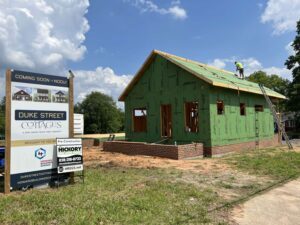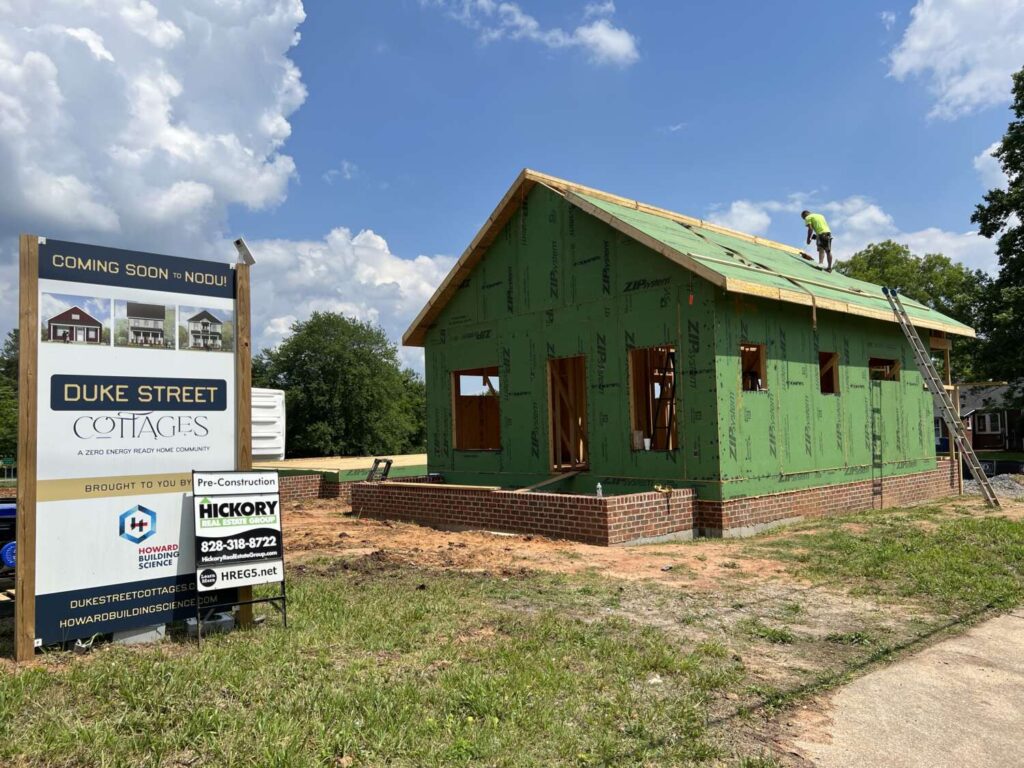
A new net-zero energy pocket neighborhood called Duke Street Cottages is under development in Granite Falls, NC.
Photo courtesy of Howard Building Science
The concept of pocket neighborhoods may be relatively new, but for Rob Howard of Howard Building Science, it’s a way to move Granite Falls, NC into the future while honoring the town’s mill village past. Technically speaking, pocket neighborhoods, a concept created by architect Ross Chapin, are clustered groups of neighboring houses gathered around a shared green space, which creates a communal sense of territory and stewardship.
“I saw Chapin speak at the Innovative Housing Summit hosted by the MicroLife Institute in Atlanta a few years ago, and I bought a copy of his book called ‘Pocket Neighborhoods: Creating Small-Scale Community in a Large-Scale World,’” Howard said. “That’s what inspired me to build one of these communities in Granite Falls.”
While eating dinner at Granite Falls Brewing Co., Howard noticed a vacant piece of land across the street. Further investigation on Caldwell County GIS revealed the owner of the 1.25 acres to be a family friend who not only sold him the land, but also financed it for him.
“It was the perfect location close to downtown with water and sewer,” said Howard, who later applied for a Planned Unit Development with the Town of Granite Falls and received approval for 11 lots surrounding a shared green space.
Howard’s net-zero energy pocket neighborhood is called Duke Street Cottages, and his team is presently in the building phase. There are currently six homes at various points in the build process. There are two floor plans being used. Both have roughly the same footprint, but one is a single story at 800 square feet with 2 bedrooms and 1 bath, while the other is two stories at 1400 square feet with 3 bedrooms and 2.5 baths.
“I felt like I was at the right place at the right time hearing Chapin speak,” Howard said. “The concept runs counter to the traditional development we’ve seen over the past 20 to 30 years with pavement down the middle. Not only will Duke Street Cottages be Zero Energy Ready Homes, there is green space down the middle and instead of a back deck, each house has an oversized front porch. The goal is for the design to foster interaction among neighbors.”
A centralized outdoor space is a key trait of a pocket neighborhood. Homeowners hold shared ownership in the common space and are collectively responsible for its care and oversight, thereby creating a sense of togetherness and security.
Sustainability is woven throughout pocket neighborhoods, from the small carbon footprints of the homes to the focus on outdoor living space. For Duke Street Cottages, additional sustainable components prioritize airtight building envelopes, energy-efficient appliances, efficient heating and cooling systems, mechanical ventilation for healthy indoor air quality, local and natural materials without harmful chemicals, solar panels, EV charging stations and sidewalks connecting the neighborhood to downtown Granite Falls.
“Along with creating a net-zero neighborhood, we’re trying to open up more ‘missing middle housing,’” Howard said. “By that, I don’t mean middle-income housing. I mean housing types in between single-family homes and large apartment buildings, including duplexes and accessory dwelling units. We like to say it’s housing that’s sustainable and attainable.”
Like many towns in the south, the history of Granite Falls is deeply ingrained in their mill village past. Shuford Mills was established in 1880. Generations of families worked in various positions at the mill, enjoying evenings and weekends on their front porches and in their yards, getting to know neighbors and keeping watch over the community. Unfortunately, the historic mill was destroyed in a massive fire in 2017, but its legacy will live on forever.
“Granite Falls is my hometown,” Howard said.“I’m excited about this project because I want to set an example for a different type of development. This is more high density than what modern Granite Falls citizens are accustomed to, but, in a way, it’s getting back to the history of our town. Shuford Mills was the primary employer for decades and there was a strong sense of community surrounding the mill and the mill village homes. So, in some ways, Duke Street Cottages is an opportunity to return to our roots.”
Susanna Shetley is a reporter at Smoky Mountain News, with which Green Built Alliance partners to publish its annual Green Building Directory.
Project Team:
Builder — Howard Building Science
HERS Rater — Southern Energy Management
Site Design — Shabeldeen Engineering
Home Plans — Tightlines Designs
SIPS — Eco-Panels
Framing — Hardin Creek Timber Frame
Roofing — Northwest Roofing and Solar
HVAC — Morris Heating & Cooling
Ventilation — Green R
Realtor — Hickory Real Estate Group
Lender — United Bank
Marketing — Pfahlert Creative Labs
You can also view this article as it was originally published on page 18 of the 2022-23 edition of the directory.


